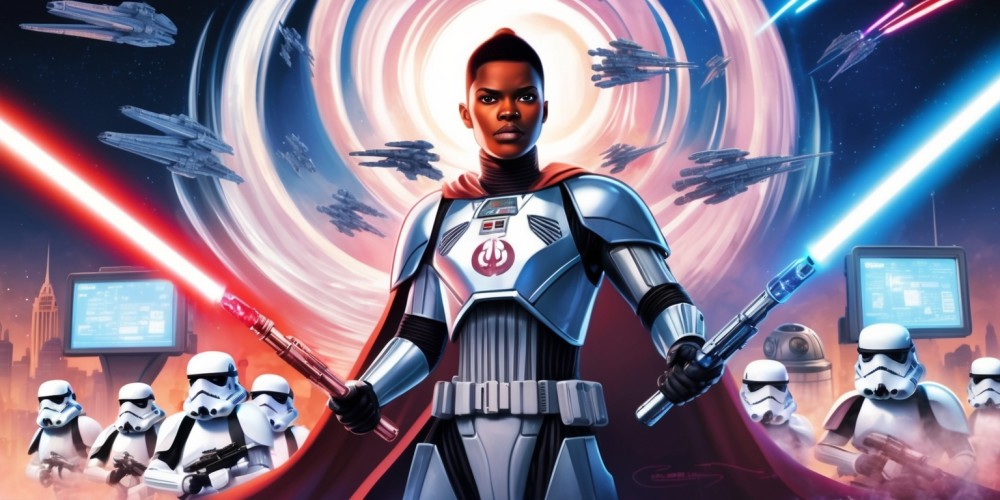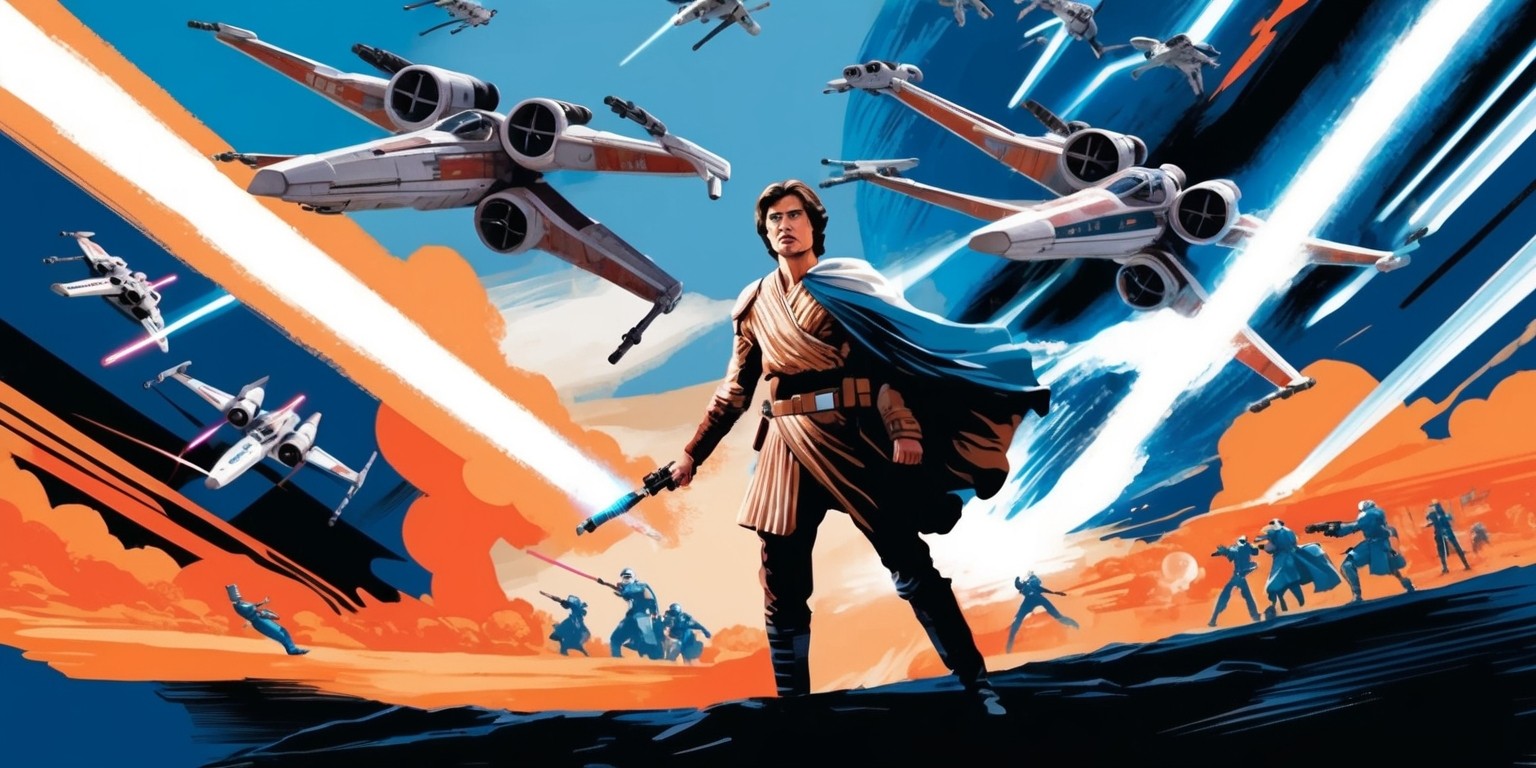Navigating Power and Democracy: The Political Legacy of Star Wars
- Jan 07, 2025
- 610

As we approach another critical election cycle in the United States, it's essential to reflect on how popular culture intertwines with political commentary. One of the most renowned series in film history history, Star Wars, originally created by George Lucas in 1977, did more than just spark imaginations with its thrilling visuals and adventures. It offered a perspective that allowed observers to delve into the dynamics of power, democracy, and authoritarianism—a theme that continues to resonate in today's political discourse. By unpacking the layers of political meaning within Star Wars, especially within the broader context of liberal thought, we can gain a deeper understanding of both the franchise and its commentary on real-world issues.
The Genesis of Star Wars
At its inception, Star Wars was conceived as a groundbreaking sci-fi film aimed primarily at children. Lucas envisioned a narrative filled with adventure, heroes, and villains, leveraging cutting-edge special effects that would captivate young audiences. Little did he know that this film would evolve into an influential cultural phenomenon, becoming a saga that transcended age demographics and sparked conversations about significant social issues.
Subtle Political Undertones
While designed for a youthful audience, Lucas embedded crucial political commentary within the narrative framework of Star Wars. By introducing complex themes of governance, rebellion, and tyranny, he invited viewers to engage with deeper questions about who holds power and how that power is exercised.
Historical Context Behind the Story
Lucas's narrative was, in part, a reflection of the unsettled socio-political environment in the 1970s, marked by the disillusionment surrounding the Vietnam War and President Nixon's contentious administration. During an interview, he articulated his intention to explore how democracies can slip into authoritarianism—a theme that resonates through today’s political landscape.
The Legacy of Vietnam War Influences

As Lucas elaborated, the Vietnam War profoundly influenced his storytelling. The conflicts within the Star Wars universe reflect a rebellion against an oppressive regime, mirroring the resistance faced by those opposed to the Vietnam conflict. This connection is particularly evident in characters like the Ewoks, who symbolize the power of grassroots movements against advanced military technologies.
Nixon’s Shadow on Emperor Palpatine
One of the most striking aspects of Lucas’s political commentary is the characterization of Emperor Palpatine. Reportedly inspired by Nixon, Palpatine embodies the manipulative and authoritarian traits often associated with political leaders who exploit crises for power. This character acts as a warning narrative, alerting viewers to the dangers of unchecked authority.
Prophesying the Future of Democracy
In his reflections, Lucas suggested that history tends to repeat itself, a notion evidenced by the political parallels drawn between his prequel trilogy and contemporary events. He noted that the erosion of democratic principles often occurs not through violent overthrow, but rather, through complacency and the gradual acceptance of authoritarian measures.
The Prequel Trilogy’s Dark Reflection
The prequels delve deeper into the transition from a democratic republic to an oppressive Empire. Lucas's exploration of this transformation coincided eerily with real-world events, especially during the presidency of George W. Bush, where civil liberties were curtailed in the name of security. The storyline illustrates the consequences of allowing fear to undermine democratic values.
Introspection Through Fiction
Lucas did not shy away from drawing parallels between characters in his saga and prominent political figures. By comparing Anakin Skywalker to Bush and Dick Cheney to Palpatine, he emphasized the cyclical character of authority and the ethical dilemmas surrounding leadership.
The Echo of the American Civil War
Further illustrating the political nuance of the Star Wars saga, the Clone Wars evoke memories of the American Civil War, highlighting themes of division and conflict. The struggle between the Republic and Separatists serves as a microcosm of larger societal rifts, prompting viewers to reflect on their histories.
Current Events and Continued Relevance
In recent installments of the franchise, such as Rogue One and Andor, political themes remain pronounced. These narratives grapple with the moral ambiguities inherent to rebellion and obedience in the face of tyranny. Lucas’s legacy lives on through these stories, prompting viewers to consider the implications of power structures in their own lives.
Star Wars as Political Allegory
Star Wars stands as a powerful allegory for current political issues, showcasing both the allure of totalitarianism and the heroic struggle for freedom. By invoking these themes, it encourages us to question authority and remain vigilant against the encroachments on democracy.
The Cultural Impact of Star Wars
The profound cultural impact of Star Wars cannot be understated. Beyond entertainment, it has cultivated a generation of thinkers who analyze the motivations and actions of those in power—sparking dialogues about civil rights, tyranny, and political engagement.
Empowering the Younger Generations
This enduring franchise educates younger audiences about the significance of their civic responsibilities. By portraying the fight for justice and freedom against oppressive regimes, it instills a sense of agency and motivates viewers to champion change in their communities.
Connecting the Dots Across Generations
The themes presented in Star Wars link past and present, demonstrating how stories can act as vessels to convey critical lessons. As new generations discover and engage with the franchise, the discussions surrounding leadership, accountability, and the balance of power will undoubtedly persist.
A Future Where Politics and Fiction Collide
As we anticipate the forthcoming elections and beyond, the relevance of Star Wars remains a demonstration of how storytelling influences our understanding of governance. It serves as a reminder that entertainment can inform political consciousness, encouraging us to remain vigilant and proactive in defending our democratic ideals.
In this era of rapidly changing political landscapes, the lessons of the Star Wars saga serve as an invaluable resource for reflection and action. The ongoing discourse surrounding democracy and authoritarianism is more significant than ever, and the powerful imagery and themes woven throughout this beloved franchise compel us to thoughtfully interact with our surrounding environment us.